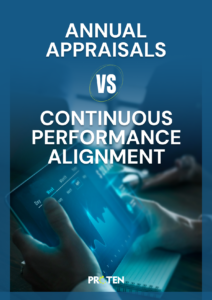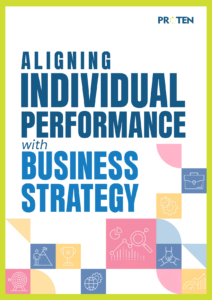Performance appraisals have become a huge component of modern workplace management for the role they play in driving improvement, aligning employee expectations with business objectives, and rewarding achievement. Yet despite their importance, employees still leave reviews feeling worse off than they came in, and managers leave wondering why their appraisals are misunderstood. This leaves both parties spinning in circles, wondering why the process feels like something to tick off on a checklist.
The problem isn’t always with the data and process, sometimes, it could be the delivery. Reviews thrive on communication, and communication thrives on emotion, so when a manager fails to recognise emotional tensions, the evaluation becomes a missed opportunity. This is where emotional intelligence makes the difference.
Performance appraisals can sometimes become emotional because they involve vulnerability, identity, and often, power dynamics, and without emotional intelligence, even well-meaning feedback can backfire. This blog explores in detail why emotional intelligence is needed in performance appraisals and how you can apply it to your appraisals.
The Problem with Traditional Performance Appraisals
Traditional performance reviews usually feel like a transactional case where the manager talks, the employee either listens or tunes out, and both parties leave feeling like they survived a formality. Here’s what typically goes wrong:
- One-way communication: Managers talk at employees, not with them.
- Overemphasis on numbers: Metrics matter, but they don’t tell the full story.
- Emotional blind spots: Managers may not pick up on anxiety, frustration, or defensiveness.
- Feedback as judgment: Employees may feel attacked or misunderstood.
- Lack of trust: Without an emotional connection, feedback feels cold and arbitrary.
In this setup, even constructive criticism can feel like a personal attack, and without emotional intelligence, feedback creates resistance instead of inspiring growth.
Yet, companies think emotional intelligence means softness, and don’t consider it as a factor that drives hard business results, but in reality, that is untrue. A study by the Journal of Applied Psychology revealed that companies that applied emotional intelligence to their performance appraisals saw their employee performance increase by 20%. From this, we can say that teams led by emotionally intelligent managers not only perform better, but they are also more engaged and experience lower turnover. In appraisals, emotional intelligence ensures feedback lands well, goals are realistic, and employees feel seen.
Why Emotional Intelligence Matters in Performance Reviews

Emotional intelligence is a critical skill that can turn tense, one-sided reviews into meaningful, two-way conversations. Here’s why it’s so important:
1. Creates a safe environment for employees
Employees are more willing to listen to what you have to say and share their views and concerns when they feel safe with you in the first place. As a manager, you should be emotionally intelligent and self-aware to create this safe environment, as these qualities help you understand how your words and tone impact others. Additionally, emotional intelligence can help you take charge of the conversation without triggering defensive reactions.
For instance, instead of telling an employee they didn’t meet expectations, an emotionally intelligent leader would instead ask them what got in the way of their goals so they can understand their perspective. The shift in tone is what makes the difference.
2. Emotional Intelligence builds trust
At the backbone of performance management is trust, and this trust is earned when managers are authentic, empathetic, and fair, focusing on supporting employees instead of just evaluating them.
Trust changes the view of employees towards performance appraisals so that instead of dreading feedback, they now look forward to it, because they know it’s coming from someone who genuinely cares about their overall growth.
3. Reduces bias and miscommunication
Emotional intelligence improves your ability to pause, reflect, and separate facts from feelings. It helps avoid quick judgment, unconscious biases, and jumping to conclusions.
For example, if you have an employee who is underperforming but also dealing with personal stress, as a manager high in emotional intelligence, you would first ask questions instead of making assumptions. This context can change how performance is addressed and what support is offered.
Emotional intelligence also enhances clarity by enabling managers to communicate more effectively, translating complex feedback into language that motivates employees.
4. Improves the quality of feedback
Most people don’t mind hearing what they can do better as long as they hear it in a way that respects their dignity. Emotional intelligence helps managers frame criticism constructively by focusing on behaviours rather than personal flaws, using empathetic language, and inviting dialogue instead of judgment.
So, for example, instead of telling an employee they’re not proactive enough, an emotionally intelligent manager might say, “I’ve noticed you sometimes wait for direction before taking action. Let’s talk about ways you can take more initiative on upcoming projects.”
That kind of feedback is specific, forward-looking, and non-threatening, and invites action, instead of defensiveness.
5. Promotes employee development
Emotional intelligence shifts the review conversation from how an employee failed to how they can grow. Emotionally intelligent managers focus on potential, not just past performance, and they do that by using empathy and social awareness to understand each employee’s motivations and challenges. This leads to development plans that work because they’re tailored to real human needs and not generic corporate checklists.
What Happens When Emotional Intelligence Is Missing?
Performance appraisals can go very badly when emotional intelligence isn’t considered in them:
- Employees feel attacked or misunderstood.
- Feedback is ignored or resented.
- Top talent becomes disengaged and leaves.
- Struggling employees don’t improve because they lack support.
- Managers feel frustrated by resistance and poor results.
Low emotional intelligence appraisals turn what should be a growth experience into a morale killer by perpetuating silence, fear, and stagnation.
How Managers Can Apply Emotional Intelligence in Performance Appraisals
Now that we’ve highlighted why emotional intelligence is important for appraisals and what happens when it’s missing from them, let’s look at how you can apply it to improve yours. Just like every other skill, emotional intelligence can be learned, practiced, and improved on.
1. Prepare with empathy
Don’t just prepare what you want to say; also prepare for how the employee might feel. Anticipate emotional responses and plan your approach accordingly by reviewing the employee’s recent experiences. Have they been dealing with change, stress, or conflict? What might they need from this conversation?
2. Start with self-awareness
Check your own emotions before the meeting. Are you frustrated? Disappointed? Proud? Or Nervous? Whatever you feel, name it, own it, but don’t let your emotions hijack the tone of the conversation.
3. Listen actively
Performance reviews should be a two-way conversation, and as the manager, it’s your job to see to that. Ask open-ended questions and give space for honest dialogue, like:
- “How do you feel about your progress this quarter?”
- “What’s been helping or hindering you lately?”
- “What kind of support do you need from me?”
Then actually listen, reflect back what you hear, and make it clear you’re paying attention.
If you want to ask questions that will hit the spot and make your employees open up, check out our blog on 100 powerful conversation starters that will reshape your performance appraisals.
4. Balance honesty with compassion
Be honest, but not brutal, because the goal is growth, not punishment, and feedback should be framed as an opportunity rather than a judgment. Start by acknowledging the employee’s strengths before moving into areas for improvement, and when offering critical feedback, pair it with curiosity and collaboration by offering to figure their situation out with them.
5. Follow up with intention
Emotional intelligence doesn’t stop when the meeting ends, which is why you must follow through on support, development plans, and check-ins. What makes feedback sink in better is consistency, and this is because showing up again and again builds trust and reinforces the notion that you’re invested in your people.
Final Thoughts…
Performance appraisals are defining moments in every employee’s journey, where the way you approach them can either build trust or break it. Managers who invest in developing emotional intelligence transform what might feel like a dreaded formality into a meaningful and motivating conversation, shifting the focus from blame to growth and from control to collaboration, thereby unlocking not only better performance but also better people practices across the entire organisation.
So the next time appraisal season rolls around, don’t just bring your data. Bring your emotional intelligence, because while it’s just one of the many things employees hope for during their reviews, it’s a powerful place to start.
To explore what else employees truly want from their performance appraisals, read this blog post.














